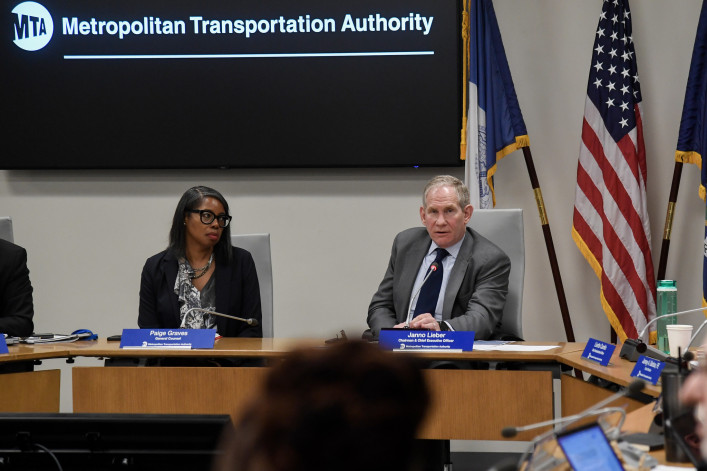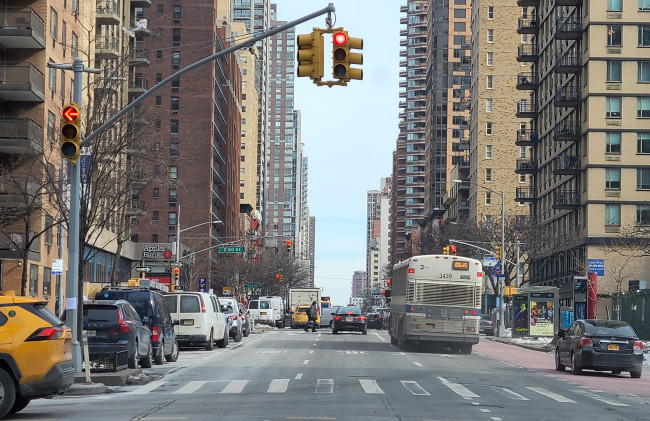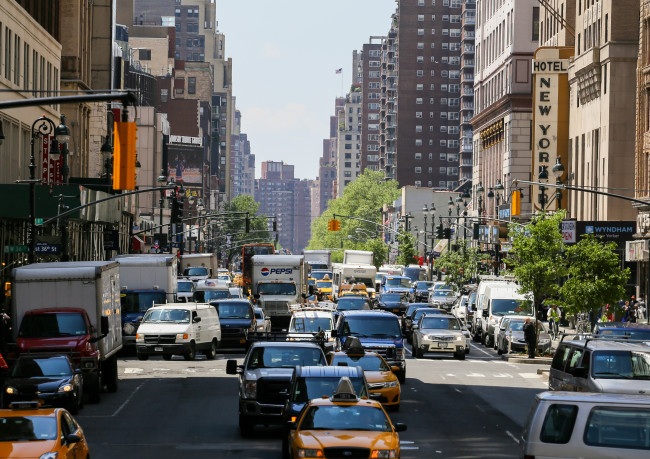NYC congestion pricing starts June 30th. Here's what you need to know
- MTA will charge drivers a $15 daytime toll to enter Manhattan south of 60th Street
- The ultimate fate of congestion pricing will depend on the outcome of federal lawsuits

Janno Lieber, MTA CEO, and Paige Graves, MTA General Counsel, at the vote in March.
Photo: Marc A. Hermann/MTA
If you live below 60th Street in Manhattan and regularly joust for street parking, or fork over hundreds of dollars a month for a garage, you should expect an additional toll come June 30th.
The Metropolitan Transit Association board voted 11-1 on March 27th to approve New York City’s congestion pricing plan, which allows the MTA to charge drivers $15 to enter Manhattan south of 60th Street during the day. Those changes will take effect on Sunday, June 30th, the MTA announced on April 27th.
The vote came five years after congestion pricing—aimed at reducing traffic and exhaust in Manhattan and funding $15 billion in mass transit improvements—was approved by the state legislature in 2019, Gothamist reported.
“[The] vote is one of the most significant the board has ever undertaken, and the MTA is ready,” MTA Chair and CEO Janno Lieber said in a March statement. “There’s more to come with the funds raised from congestion pricing—more accessible stations, modernized subway signals, and new expansion projects.”
[Editor's Note: This story was updated on April 29th to reflect that congestion pricing will begin on Sunday, June 30th.]
Manhattan drivers should expect tolls
Under the plan, drivers should expect new tolls as early as June, Gothamist reported.
Passenger vehicles and small vans will pay a $15 dollar toll to enter Manhattan south of 60th Street in Manhattan between the hours of 5 a.m. and 9 p.m. on weekdays and 9 a.m. to 9 p.m. on weekends. Overnight, those tolls drop to $3.75, according to the MTA.
Cars driving on the West Side Highway and FDR drive are exempt from the toll.
The fees are higher for trucks and buses, at $24 to $36 during the day, and at $6 or $9 at night. But transit buses, emergency vehicles, and government vehicles are exempt, according to the MTA.
All of these tolls are 50 percent higher for drivers who don’t have an E-ZPass, so if you expect to do a lot of commuting by car, you might want to sign up.
What to know about exemptions and discounts
Drivers who make less than $50,000 or who use certain government benefits can apply for discounts, and those entering from the Holland, Battery, Lincoln, and Queens-Midtown tunnels will pay reduced tolls because they’ve already paid fees at those bridges, according to the MTA. You can apply for that low-income discount plan online.
Residents of the toll zone whose households make less than $60,000 per year can qualify for a tax credit in the amount of the tolls they have paid, though details on claiming those credits are scant. Those with disabilities will also be able to apply for an exemption, according to the MTA.
Taxi drivers are also exempt from the daily toll, though app-based vehicles would be expected to pay $2.50, according to the MTA.
Lawsuits still threaten congestion pricing
There are at least four lawsuits that could put the breaks on congestion pricing, NY1 reported.
One from New Jersey argues that the plan has significant environmental impacts, and the suit could trigger another environmental impact review by the federal government. (The MTA, state, and city officials did an environmental assessment of the plan that found it had no significant impacts, and it scored federal approval last year). Oral arguments in that case are set for April 4th, NY1 reported.
Some Manhattan residents raise objections
Corinne Arnold and Will Kwan, both members of co-ops boards at buildings located in the toll zone, raised concerns that the pricing plan would lead to lower revenues by retailers and parking garages within the zone and add an extra expense for commuters living below 60th Street but driving to work outside of it. (The wrote an article on the topic for Brick Underground, FYI).
“Our overarching concern is that there was not enough research done, that it is not ready, and that co-ops and condos were not involved,” Arnold said.
The two circulated a petition, shared by the Council of New York Cooperatives & Condominiums, requesting that the MTA delay congestion pricing plan for six months to determine how it will impact the zone’s economy.
You Might Also Like


























